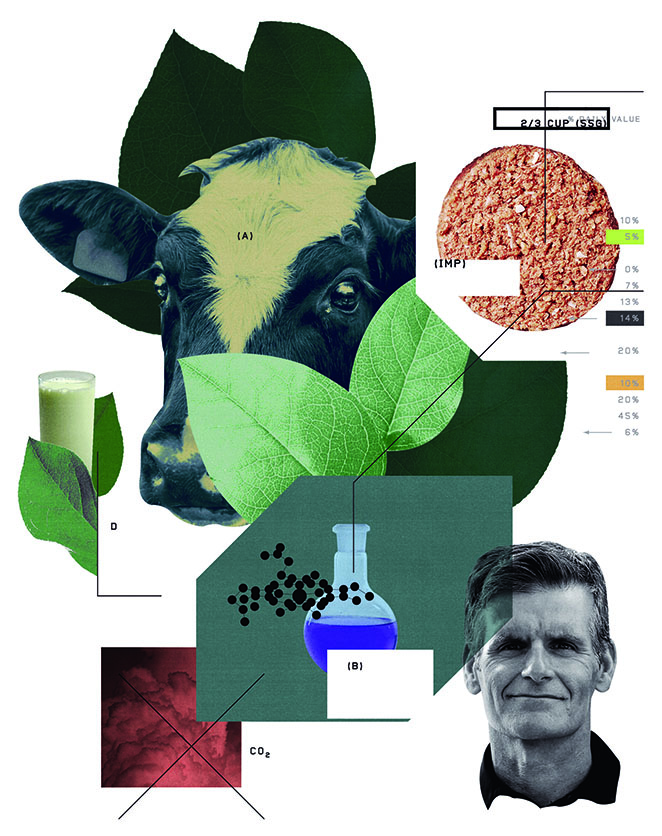Dennis Woodside: Driving High-Tech Transformation at Impossible Foods
It seems impossible that an executive with a resume like Dennis Woodside’s would be interested in a job flipping burgers. Woodside, JD ’95, distinguished himself at Google, where he presided over the explosion in its global advertising business as president of the Americas and led Motorola Mobility as its CEO while it was part of Google. Next, he was COO at Dropbox, which pioneered now ubiquitous cloud file storage. But in 2019, Woodside became president of Impossible Foods, the fast-growing, plant-based-meat company whose patties are now everywhere from Starbucks to Walmart. He says the mission is right in line with his strength: driving high-tech transformation.
“We are investing in technology. We’re thinking about meat the way Apple thinks about phones—our product is going to get better and better every year and the costs will come down. Less than 1 percent of the agricultural industry’s revenues go into R&D, and a cow is not going to get better every year,” he says.
Woodside is among a significant group of Stanford Law alums who found their calling in business rather than law. He grew up in Washington Crossing, Pennsylvania, and spent his undergraduate years at Cornell. He arrived at Stanford in the early 1990s when innovation was erupting everywhere. Across campus, Jerry Yang and David Filo were beginning to get traction with their novel “Yahoo!” web directory, and venture capitalists were prowling the STEM hallways with their checkbooks.

At SLS, Woodside enjoyed a broad array of law classes, particularly Joseph A. Grundfest’s securities regulation course. Grundfest, JD ’78, William A. Franke Professor of Law and Business, says he remembers Woodside well: “Every year you have students you wish you could invest in. I would have gone long on Dennis Woodside. He exuded leadership, organization, and thoughtfulness.”
Woodside also was a rare triathlete along with classmate David Smolen, JD ’95 (MA ’96). The friends once trained by donning wetsuits and swimming laps in Lake Lagunita. “Dennis brings an intensity to everything he does,” says Smolen, who now works in private equity as general counsel at GI Partners in San Francisco.
Woodside did a federal clerkship in New York after graduation, assisting Judge Dennis Jacobs in cases ranging from financial fraud to terrorism. He then joined the Los Angeles law firm Munger, Tolles & Olson. But in private practice he says he discovered that “I wasn’t an awesome lawyer. There’s a level of detail in corporate law that’s almost like software coding.”
Time for a pivot. Woodside’s wife, Laura Gerrity Woodside, JD ’97, joined management consulting giant McKinsey directly after SLS, and before long, she says, it was clear, “Dennis was drawn to the business side too.” He soon joined McKinsey himself. “I liked the higher-level thinking,” he says. At McKinsey he had another front-row seat at disruption: “Clients were all asking, how will the internet change our business?”
In 2003, a former colleague recruited Woodside to Google to help chart the company’s strategic future. He took the job, in part, after his neighbor explained how she found a specialist to treat her rare cancer by using Google. “That was pretty powerful. The service had literally changed her life.” Woodside says he realized the potential for broad impact was enormous.
Woodside joined Dropbox in 2014 as its COO and helped grow the company dramatically. After its IPO, Woodside was looking for his next challenge when venture capitalist Vinod Khosla introduced him to Pat Brown, the Stanford biochemistry professor, emeritus, who founded Impossible Foods when he became focused on climate change and the greenhouse gases resulting from animal-based meat production. “The agricultural industry creates more greenhouse gases than all of transportation combined,” Woodside notes. And he said it irked Brown that climate activists would issue dire warnings about fossil fuels “and then go off and have a steak dinner.”
Brown started Impossible Foods in 2011 and his team found a way to genetically modify pea plants to produce a molecule similar to heme, the molecule in animal blood hemoglobin, which also happens to give meat its juicy texture. Combining it with soy and other ingredients, Impossible finally refined a recipe that was a hit with consumers looking for non-meat burgers. The company became part of a hot new product segment of plant-based meats, with its leading competitor the slightly older Beyond Meat, and also major corporate players including Kellogg’s and Tyson Foods. Today, meat alternative is a billion-dollar category of food that is growing fast.
“We’re thinking about meat the way Apple thinks about phones—our product is going to get better and better every year and the cost will come down.”
– Dennis Woodside, JD ’95
President, Impossible Foods
Woodside thinks the moment is right for the plant-based-meat category. “It’s not like people are in love with the idea that they’re eating a cow. We’re going to make the meat of every animal you can eat from plants.” So far, Impossible has created burgers and more recently a plant-based pork sausage stand-in—Starbucks’ new Impossible breakfast sandwich.
Impossible’s primary strategy is not focused on vegetarians, who make up less than 5 percent of the population. Rather, it’s about suggesting that plant-based meats are good for people and critical for the health of the planet. He says, “Consumers are more aware of COVID breakouts in slaughterhouses and the fragility of animal-based products in general.”
In another COVID-related shift, Impossible has refocused its initial restaurant-based strategy to instead push the company’s products into retail grocery stores, from Walmart to Safeway, as well as large fast food chains.
Woodside is convinced that culture is moving in the direction his company is racing to shape. “Eating animals is going to be regarded as smoking is today—socially unacceptable behavior,” he predicts. In any case, plant-based meat sounds like a reasonable bet to go long on. SL
Joan O’C. Hamilton, a freelance writer, is a former bureau chief for BusinessWeek Magazine.
